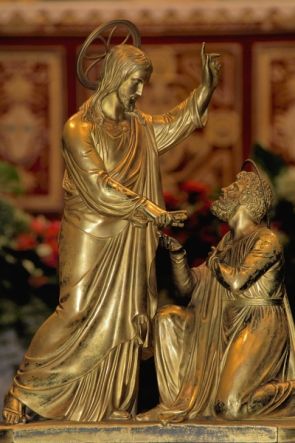|
Verba Tua manent in aeternum
Man's rights spring from his duty toward God
|
|
|
Au Milieu des Sollicitudes Encyclical of Pope Leo XIII (February 16th 1892): 28. We shall not hold to the same language on another point, concerning the principle of the separation of the State and Church, which is equivalent to the separation of human legislation from Christian and divine legislation. We do not care to interrupt Ourselves here in order to demonstrate the absurdity of such a separation; each one will understand for himself. As soon as the State refuses to give to God what belongs to God, by a necessary consequence it refuses to give to citizens that to which, as men, they have a right; as, whether agreeable or not to accept, it cannot be denied that man's rights spring from his duty toward God. Whence if follows that the State, by missing in this connection the principal object of its institution, finally becomes false to itself by denying that which is the reason of its own existence. These superior truths are so clearly proclaimed by the voice of even natural reason, that they force themselves upon all who are not blinded by the violence of passion; therefore Catholics cannot be too careful in defending themselves against such a separation. In fact, to wish that the State would separate itself from the Church would be to wish, by a logical sequence, that the Church be reduced to the liberty of living according to the law common to all citizens.... It is true that in certain countries this state of affairs exists. It is a condition which, if it have numerous and serious inconveniences, also offers some advantages - above all when, by a fortunate inconsistency, the legislator is inspired by Christian principles - and, though these advantages cannot justify the false principle of separation nor authorize its defence, they nevertheless render worthy of toleration a situation which, practically, might be worse. |
|

